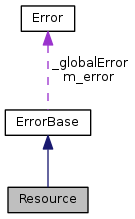#include <Resource.h>


Public Member Functions | |
| virtual | ~Resource () |
| uint32_t | Allocate (const char *resourceDesc) |
| uint32_t | Allocate (uint32_t index, const char *resourceDesc) |
| void | Free (uint32_t index) |
 Public Member Functions inherited from ErrorBase Public Member Functions inherited from ErrorBase | |
| virtual Error & | GetError () |
| Retrieve the current error. Get the current error information associated with this sensor. | |
| virtual const Error & | GetError () const |
| virtual void | SetErrnoError (const char *contextMessage, const char *filename, const char *function, uint32_t lineNumber) const |
| Set error information associated with a C library call that set an error to the "errno" global variable. More... | |
| virtual void | SetImaqError (int success, const char *contextMessage, const char *filename, const char *function, uint32_t lineNumber) const |
| Set the current error information associated from the nivision Imaq API. More... | |
| virtual void | SetError (Error::Code code, const char *contextMessage, const char *filename, const char *function, uint32_t lineNumber) const |
| Set the current error information associated with this sensor. More... | |
| virtual void | SetWPIError (const char *errorMessage, const char *contextMessage, const char *filename, const char *function, uint32_t lineNumber) const |
| Set the current error information associated with this sensor. More... | |
| virtual void | CloneError (ErrorBase *rhs) const |
| virtual void | ClearError () const |
| Clear the current error information associated with this sensor. | |
| virtual bool | StatusIsFatal () const |
| Check if the current error code represents a fatal error. More... | |
Static Public Member Functions | |
| static void | CreateResourceObject (Resource **r, uint32_t elements) |
 Static Public Member Functions inherited from ErrorBase Static Public Member Functions inherited from ErrorBase | |
| static void | SetGlobalError (Error::Code code, const char *contextMessage, const char *filename, const char *function, uint32_t lineNumber) |
| static void | SetGlobalWPIError (const char *errorMessage, const char *contextMessage, const char *filename, const char *function, uint32_t lineNumber) |
| static Error & | GetGlobalError () |
Additional Inherited Members | |
 Protected Member Functions inherited from ErrorBase Protected Member Functions inherited from ErrorBase | |
| ErrorBase () | |
| Initialize the instance status to 0 for now. | |
 Protected Attributes inherited from ErrorBase Protected Attributes inherited from ErrorBase | |
| Error | m_error |
 Static Protected Attributes inherited from ErrorBase Static Protected Attributes inherited from ErrorBase | |
| static SEM_ID | _globalErrorMutex = semMCreate(SEM_Q_PRIORITY | SEM_DELETE_SAFE | SEM_INVERSION_SAFE) |
| static Error | _globalError |
Detailed Description
The Resource class is a convenient way to track allocated resources. It tracks them as indicies in the range [0 .. elements - 1]. E.g. the library uses this to track hardware channel allocation.
The Resource class does not allocate the hardware channels or other resources; it just tracks which indices were marked in use by Allocate and not yet freed by Free.
Definition at line 23 of file Resource.h.
Constructor & Destructor Documentation
|
virtual |
Delete the allocated array or resources. This happens when the module is unloaded (provided it was statically allocated).
Definition at line 52 of file Resource.cpp.
Member Function Documentation
| uint32_t Resource::Allocate | ( | const char * | resourceDesc | ) |
Allocate a resource. When a resource is requested, mark it allocated. In this case, a free resource value within the range is located and returned after it is marked allocated.
Definition at line 62 of file Resource.cpp.
| uint32_t Resource::Allocate | ( | uint32_t | index, |
| const char * | resourceDesc | ||
| ) |
Allocate a specific resource value. The user requests a specific resource value, i.e. channel number and it is verified unallocated, then returned.
Definition at line 82 of file Resource.cpp.
|
static |
Factory method to create a Resource allocation-tracker if needed.
- Parameters
-
r – address of the caller's Resource pointer. If *r == NULL, this will construct a Resource and make *r point to it. If *r != NULL, i.e. the caller already has a Resource instance, this won't do anything. elements – the number of elements for this Resource allocator to track, that is, it will allocate resource numbers in the range [0 .. elements - 1].
Definition at line 39 of file Resource.cpp.
| void Resource::Free | ( | uint32_t | index | ) |
Free an allocated resource. After a resource is no longer needed, for example a destructor is called for a channel assignment class, Free will release the resource value so it can be reused somewhere else in the program.
Definition at line 105 of file Resource.cpp.
The documentation for this class was generated from the following files:
Generated on Sat Apr 26 2014 12:26:46 for WPILibC++ by
 1.8.6
1.8.6
Powered by Onnac
I do not condone or encourage graffiti. Please paint responsibly.